
Many great ideas from Elizabeth Warren
A recent opinion by Howard Sierer in The Independent, “Another bad idea from Elizabeth Warren,” suggests that student loan forgiveness and other social programs need to be curtailed or eliminated.
I get it!
Government-funded social programs for people who could use help or support are bad; the government lowering income tax rates primarily for corporations and the wealthy is good. Makes perfect sense to me … especially if your priorities are backwards.
“Sen. Elizabeth Warren proposes loan forgiveness of $640 billion in federal student loans,” Sierer wrote. “Add this bad idea to others she’s proposed or endorsed: Medicare for All, the Green New Deal, free college tuition for all, a $15 hourly minimum wage, and banning right to work laws. The list goes on.”
State legislatures’ support of higher education or federal help in providing help for massive student loan debt is wasting money, in his opinion. So basically, if you can’t afford it, don’t bother to go to college. Besides, students will probably get “indoctrinated” by all those liberal professors. Also, most students will waste their time and our money taking some useless liberal education major that won’t help them get a worthwhile job or career. Therefore, they will not be able to repay their student loans. That seems to sum up his position.
However, the following figure suggests that higher education is well worth the time and money spent. Consideration must also be given to a person’s overall satisfaction and contentment with their chosen job or career, which is likely to be higher with more education, more job satisfaction, and greater income.
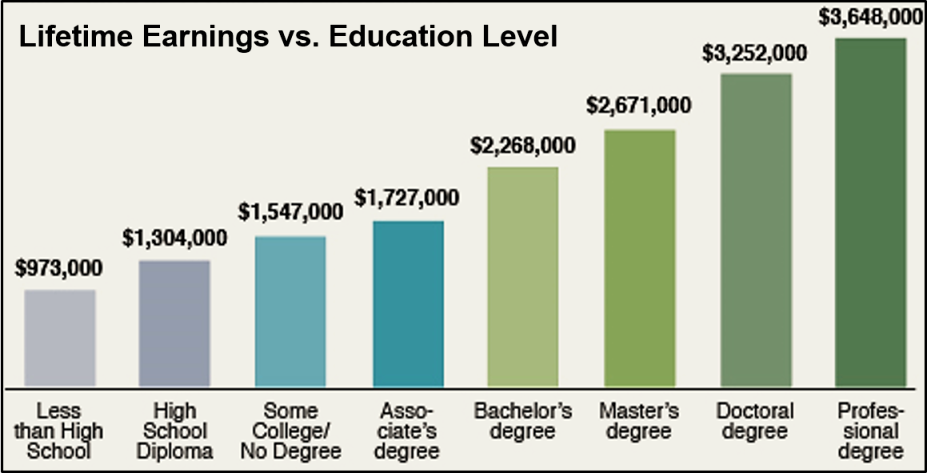
“Students are left holding the bag, especially if they’ve chosen majors that offer little chance for careers that will allow them to repay their loans,” Sierer wrote. “Are you aware of any middle-income jobs for ethnic studies majors?”
Well, let’s consider the overall rate of income versus unemployment compared with level of education. As the figure below indicates, an increasing level of education correlates with a lower overall unemployment rate. Again, a college or university level of education is quite beneficial. Looks to me like middle-income job opportunities are available. Not sure why there is a problem with ethnic studies majors. If I remember correctly, years ago this same conservative mindset picked on “underwater basket weaving” as the derogatory college major.
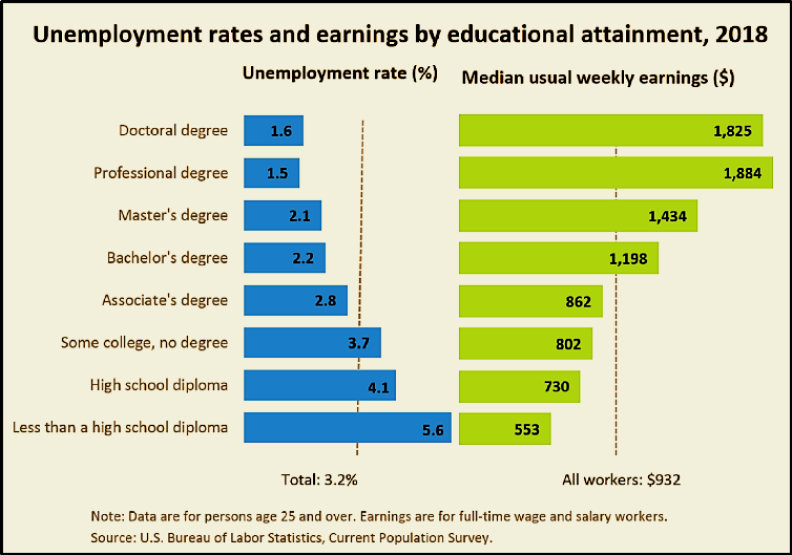
Also, consider the purpose if higher education. Is a society better off with a more educated population? I think so.
Is higher education just for the affluent and simply just to train them for a job? I think not! All that other book learning, general education requirements, exposure to various ideas from a diverse group of people, and interactions with peers and faculty might actually allow them to learn and think. Apparently, however, such learning and knowledge is not considered a good thing by many conservatives or by repressive societies. This speaks to the fact that totalitarian, repressive societies always go after the academics and intelligentsia of their populations. Oh, I know it is much easier to control the masses if they are kept as ignorant as possible.
Regarding the painful increases in tuition which have occurred over the past few decades, consider the following report.
On March 3, 2014, The Chronicle of Higher Education listed 70 four-year public colleges and universities around the U.S. and indicated the percentage decline in state support funds that has occurred between 1987 and 2012.
It reported universal decreases in legislative monetary support ranging from -35.9 percent to -3.7 percent. This decrease is also a factor in previous and current tuition increases. It seems quite short sighted for our society to make it more expensive and more difficult to obtain a higher level of education. Government student loans and grants are an important attempt to level the playing field between more affluent and less affluent students.
Sierer considers other government social support programs such as welfare, SNAP, Medicaid, and such to also be a waste of money and suggests that these programs are just handouts that will make people lazy.
After all, who really gives a damn about the roughly 52 million people in the U.S. who have an IQ of 85 or less? Same for the many millions, including service veterans, who have some physical or mental disability (see figures below). Are we to consider that low IQ individuals and people with disabilities are all just really lazy and not worth helping? Kind of selfish, as in “I’ve got mine, so to heck with you!”

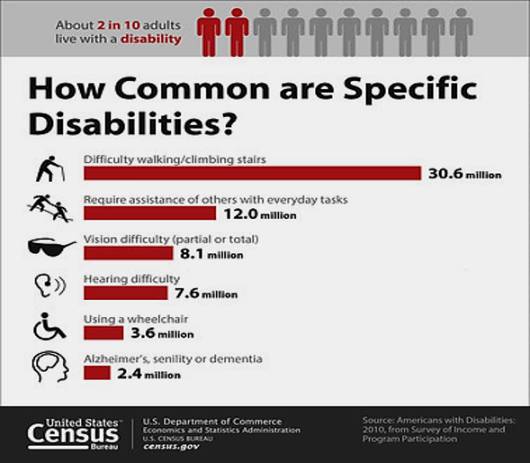
So, do these programs all represent a so-called step towards socialism? Really, what could these people contribute to our society anyway?
Oh, I know, all of these social programs cost money — your hard-earned tax dollars — and that is why the federal deficit and federal debt are growing at an alarming rate. We simply must eliminate all of these socialist programs!
However, Sierer seems to consider the massive Trump Administration tax break for corporations and mainly the wealthy at only $1.5 trillion dollars as being clearly worthwhile. After all, they really need all that extra money. And as we have learned from previous experience, beginning with the Reagan presidency, corporations will use their tax gifts to provide jobs. It’s the infamous trickle-down syndrome. Although it has never worked at any state or federal level, but surely this time…
And finally, although not discussed in Sierer’s opinion piece, it is worth considering current and past wages and the federal government poverty level (figure below). The federal minimum wage is $7.25 per hour, although in some states, particularly on the west and east coasts, this wage is higher — up to about $14 per hour in D.C. At the standard minimum wage of $7.25 per hour and a 40-hour work week for 50 weeks, a person’s annual income would be around $16,000. For a family of just two adults, that income would be below the federal government’s poverty level.
The average monthly rent for a decent one-bedroom apartment here in St. George is at least $800 per month, not including utilities. Assuming that a full-time position would include health insurance, that would leave our family of two about $500 per month for utilities, food, a car, and any insurance. That is appalling!
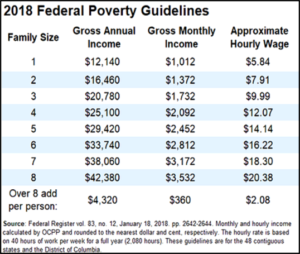
If this two-person family has one member working full time, but because of crappy wages the family income is below the federal poverty level, they can apply for various welfare programs. If they do that, should they be considered just simply lazy and looking for a free handout?
Lastly, a long-term comparison, say since the 1980s, indicates that increasing costs for goods and services — the rate of inflation — has outstripped increases in wages, especially for the bottom 90 percent of wage earners.
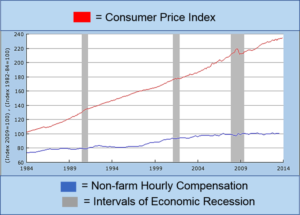
In conclusion, what is quite evident in the United States for the past few decades is that minimal increases in overall hourly income have been greatly outstripped by increases in cost of goods and services. Income for the upper 10 percent of our population is increasing such that the disparity with the lower 90 percent is increasing. Vast income inequality is not a good thing for any society.
Our burgeoning population, which is currently over 325 million people, is coupled with an increase in numbers of individuals with learning disabilities and physical disabilities.
Outsourcing of manufacturing to other countries has eliminated a large number of jobs with decent salaries but has maintained or increased managerial and executive incomes.
Decreasing the income tax rates primarily for high-end earners and corporations, with the idea that this will promote the infamous “trickle-down” concept, has never worked and comes with an increasing federal debt.
Therefore, to talk of and promote curtailing or eliminating various federal aid and health programs is misguided at best, may be a result of ignorance of what is occurring, often results from fear of others who are somehow “different,” and can also be a result of simple selfishness.
The viewpoints expressed above are those of the author and do not necessarily reflect those of The Independent.
How to submit an article, guest opinion piece, or letter to the editor to The Independent
Do you have something to say? Want your voice to be heard by thousands of readers? Send The Independent your letter to the editor or guest opinion piece. All submissions will be considered for publication by our editorial staff. If your letter or editorial is accepted, it will run on suindependent.com, and we’ll promote it through all of our social media channels. We may even decide to include it in our monthly print edition. Just follow our simple submission guidelines and make your voice heard:
—Submissions should be between 300 and 1,500 words.
—Submissions must be sent to editor@infowest.com as a .doc, .docx, .txt, or .rtf file.
—The subject line of the email containing your submission should read “Letter to the editor.”
—Attach your name to both the email and the document file (we don’t run anonymous letters).
—If you have a photo or image you’d like us to use and it’s in .jpg format, at least 1200 X 754 pixels large, and your intellectual property (you own the copyright), feel free to attach it as well, though we reserve the right to choose a different image.
—If you are on Twitter and would like a shout-out when your piece or letter is published, include that in your correspondence and we’ll give you a mention at the time of publication.



